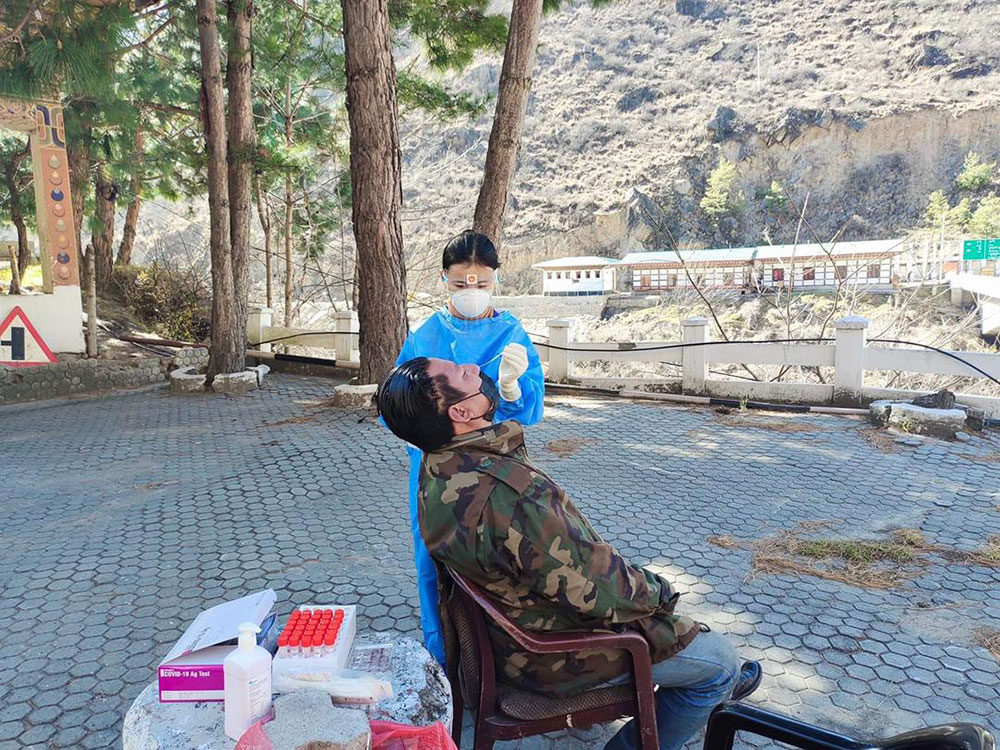… Massive Covid-19 screening across 14 dzongkhags after local case emerges in Wangdue
With only two samples testing positive from Punatsangchhu colony out of more than 7,800 samples collected from the 14 dzongkhags, that went under the “blackout” period yesterday, the Prime Minister’s Office (PMO) announced that the dzongkhags will now open into zoning system for 72 hours with immediate effect.
The zoning system (mega zones, zones or a practical system that is convenient for local taskforces to implement) is being considered as a cautious reopening while being mindful of the incubation probabilities of the virus. It will be followed by further health surveillance.
“Despite detecting community cases in recent days, with all 224 samples in Gelephu testing negative and 486 community samples in Phuentsholing also testing negative, we have decided to place them under similar zoning system as the other districts for the next 72 hours,” the release from the PMO stated.
Health workers collected 6,655 samples across the country as of 6.30pm yesterday following the enforcement of the 24-hour “blackout” period in 14 dzongkhags at around 2am yesterday.
The decision came after a middle-aged expatriate worker at Phunatshangchhu hydropower project (PHPA I) tested positive yesterday in Wangdue.
According to the Prime Minister’s office (PMO) over 13,000 individuals have moved out of Wangduephodrang since January 10. The collection of samples continued until 9pm yesterday and will continue today.
The PMO in its late evening update yesterday dropped a hint of the possibility of extending the ‘blackout’ period. The notification stated that the government will be able to determine the ‘blackout’ status and relaxation measures only after the results of the samples and substantial evidence.
The analysis of the samples was underway in all the Covid-19 testing centres when this article was filed at past midnight. In Gelephu, sources said sample collection was conducted throughout the night.
PMO announced the 24 hours “blackout” in Thimphu, Wangduephodrang, Punakha, Paro, Gasa, Haa, Chukha, Trongsa, Bumthang, Dagana, Sarpang, Tsirang, Samtse and Zhemgang with immediate effect.
No movement of people and vehicles was allowed unless authorised for essential purposes. Emergency health-related travels, which include vehicles moving towards hospitals and health facilities were permitted.
In the gewogs of 14 dzongkhags, individuals were allowed to step out and attend to the important chores within the premises.
In addition to testing recent travellers in 14 dzongkhags, regular tests continued in the remaining six dzongkhags. The highest samples collected were from Thimphu with 1,319 followed by Paro with 1,237, Tsirang with 1,006, and Wangduephodrang with 830 samples collected.
The Ministry of Health has also urged individuals who have travelled out of Wangdue from 1 January 10 this year to come forward for Covid-19 testing at the testing centre in their mega zone, one from each cohort or family who have travelled together.
The testing centres are available at four mega zones in Thimphu; at north Dechencholing higher secondary school, south at Dr Tobgyel School, core zone 1 (C1) at Mothithang Higher Secondary School and Core zone-2 at RBP flu clinic.
There were rumours that the ‘blackout’ period would be extended for another 72 hours excluding yesterday. A WhatsApp group message believed to be shared among health personnel went viral yesterday evening suggesting that restrictions would remain and triggering speculation.
A draft proposal of the Southern Covid-19 task force in Phuentsholing on a seven-day lockdown was leaked and published on mainstream media creating some confusion among netizens.
Wangdue
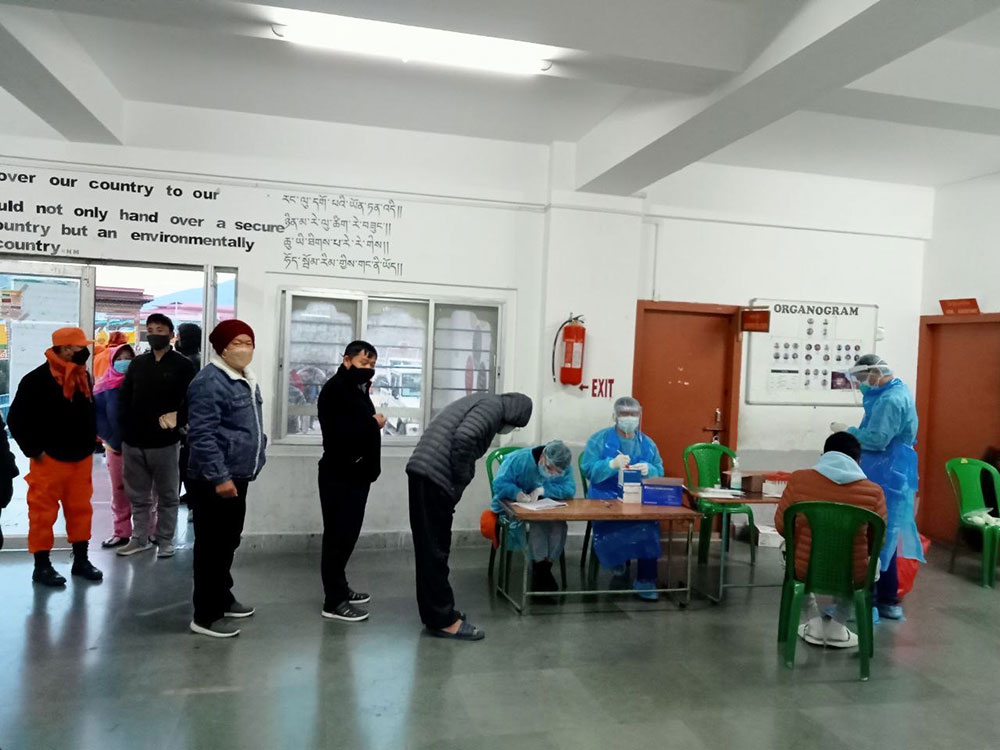
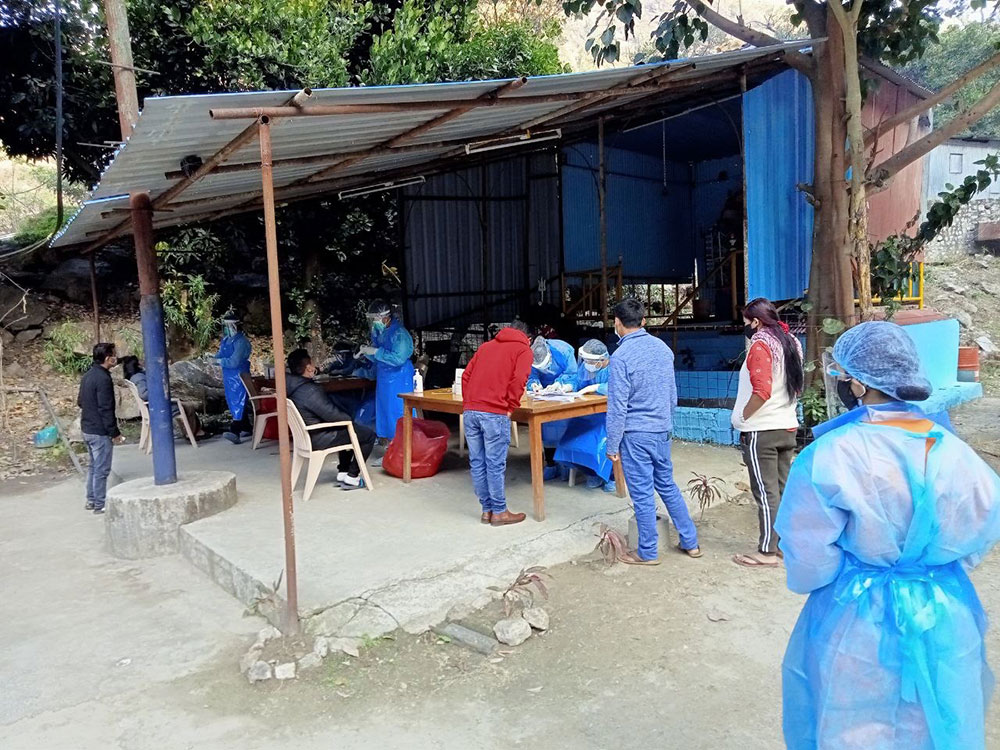
Mass screening underway in Wangdue
More than 900 samples were collected as of yesterday evening from the community and those who came in contact with the 35-year-old man who tested positive on January 15 from the community in Wangdue.
The man is an employee of Hindustan Construction Company (HCC), a construction company with Punatsangchhu Hydroelectric Project I (PHPA I).
The man, who has been working for about a year in Bhutan, visited the nearest flu clinic with symptoms.
After he tested positive on an antigen test on January 14, the man was kept in isolation while his samples were sent to Thimphu. His results were confirmed positive on January 15.
As of yesterday evening, it was learnt that the man had not come into contact with any imported workers who were brought to Wangdue for the PHPA II project.
Wangdue Dzongdag, Sonam Jamtsho, said that it wasn’t possible that the worker had come in contact with imported workers because security is stringent.
“We are still not sure how he was infected.”
The dzongkhag began community screening right after the blackout for 24 hours was announced yesterday.
According to the minutes of the task force meeting held yesterday, community screening was to be held in Basochhu, Langlaytsawa, Rurichhu, and the HCC colony.
Kuensel learnt that the collection of samples of the close contacts of the man was ongoing.
Punakha
In Punakha, more than 550 samples were collected from the community and those who visited the PHPA vicinity.
According to the Ministry of Health’s directions, a few stranded travellers were also being tested.
As of yesterday evening, no one tested positive for antigens.
Tsirang
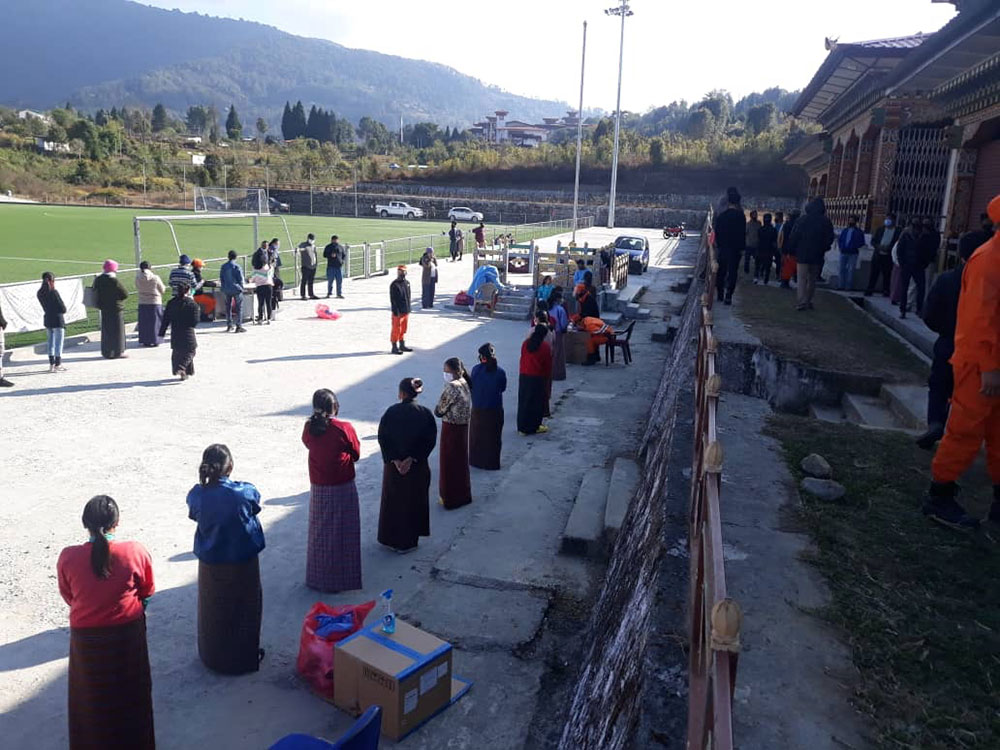
All samples tested negative in Tsirang
Meanwhile, more than 1,000 people visited the flu clinics for Covid-19 tests in Tsirang yesterday. This, according to an official, is a comparatively huge turnout.
Most people who came for the test were in-bound travellers and those with flu-like symptoms.
The dzongkhag carried out community screening and screening in gewog BHUs.
In Dagana, 261 people were screened for Covid-19 in three flu clinics in Dagapela, Dagana, and Lhamoidzingkha, according to the dzongkhag health officer Dorji Wangchuk. No positive cases were detected in either of the dzongkhags.
Paro
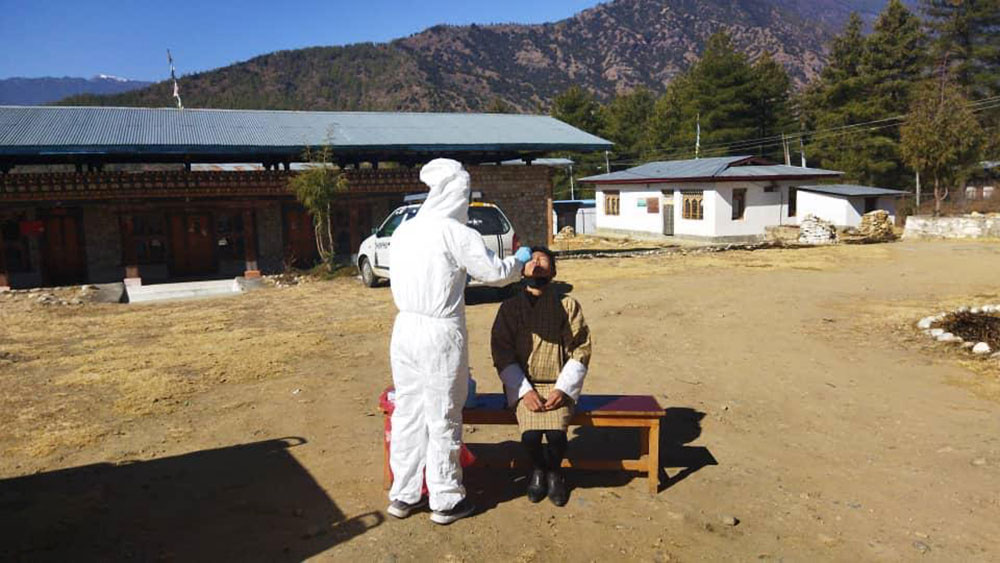
Following the directive of the National Covid-19 Task Force, Paro and Haa declared a ‘24-hour blackout’ yesterday. The two dzongkhags collected more than 1,300 samples from incoming travellers, taxi drivers, front line workers, and those with flu-like symptoms.
Paro collected a total of 1,237 swabs that included incoming travellers (665), taxi drivers (332), frontline workers(16) and those with flu-like symptoms (224). The samples were collected at nine gewog centres and the Out-Patient Department ( flu-clinic located within the Paro hospital). A total of 161 frontline workers tested negative on rapid antigen.
According to Paro Dzongdag Karma Thinley, the dzongkhag activated its emergency hotline (1060), and the flu clinic was moved from the hospital compound to the Melam Chenmo ground.
He said that the dzongkhag facilitated the release of 21 individuals who completed their quarantine yesterday as they reside in Paro. However, the dzongkhag retained 77 individuals as they had to travel out of Paro.
According to dzongkhag’s implementation report, movement has been suspended to carry effective contact tracing. However, the movement for medical emergencies and essential services was facilitated.
The report states that gewog administrative officers monitored the ‘blackout’ protocols and facilitated the contact tracing. Nine teams including health workers and de-suups had been tracing contacts in the gewogs.
The health team also decided to test all symptomatic people.
The Check Post Management System record shows that 541 individuals have travelled from Wangduephodrang to Paro starting January 10. The travellers were called for testing at the nearest gewog centre. Besides, all taxi drivers have been informed to undergo testing at the nearest gewog centre facilitated by the Road Safety and Transport Authority’s transport officer.
Besides providing emergency services, the dzongkhag also facilitated the travel of those who visit the hospital for RT-PCR test to travel outside the country on producing their travel clearance from the Department of Immigration.
Haa
The health officials in Haa collected 129 samples for antigen tests that included people arriving from Wangduephodrang and taxi drivers.
According to dzongkhag health officer Samten, all samples tested negative, and 20 RT-PCR samples of people who arrived from the high-risk areas were sent to Royal Centre for Disease Control (RCDC) in Thimphu.
He said that there was no major issue in the dzongkhag and urged people with flu-like symptoms to visit the flu clinic.
The dzongkhag issued a notification allowing people in gewogs to attend to essential chores within their premises and avoid crowding.


